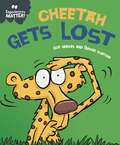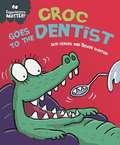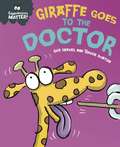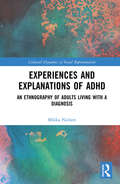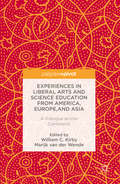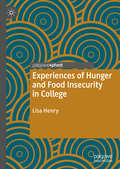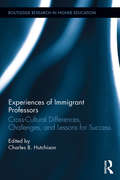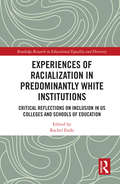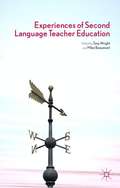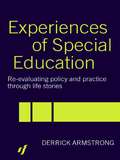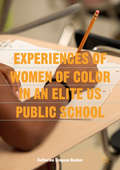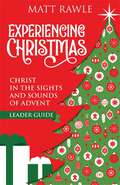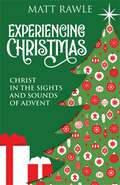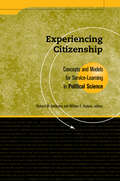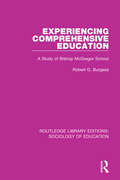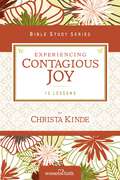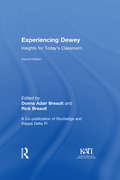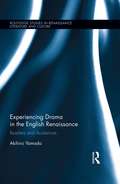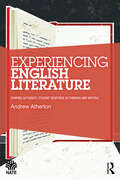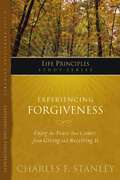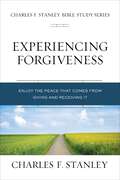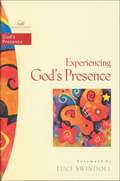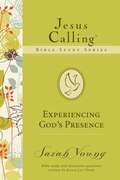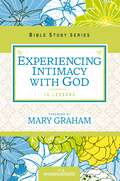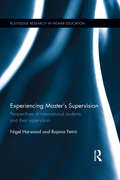- Table View
- List View
Experiences Matter: Cheetah Gets Lost (Experiences Matter)
by Sue GravesCheetah Gets Lost offers a gentle introduction to the experience of getting lost for young children.This funny, charming story is the perfect way to introduce young children to the experience of getting lost. Also included are suggestions for activities and ideas to talk through together to help children reflect on their own experiences.When Cheetah gets lost on a day out with his friends and Uncle Hippo, he must try to keep calm and remember what to do to stay safe and find help.The Experiences Matter series of picture books provide a gentle means of discussing experiences, boosting self-esteem and reinforcing good behaviour. Supports the Personal, Social and Emotional Development Area of Learning in the Early Years Foundation Stage, and is also suitable for use with children in KS1 and can be used to discuss values. Suitable for children under 5.
Experiences Matter: Croc Goes to the Dentist (Experiences Matter)
by Sue GravesCroc Goes to the Dentist offers a gentle introduction to the experience of visiting the dentist for young children.This funny, charming story is the perfect way to introduce young children to the experience of visiting the dentist. Also included are suggestions for activities and ideas to talk through together to help children reflect on their own experiences.Crocodile loves sweet things, but when her teeth start to hurt, she needs to visit the dentist. Crocodile feels nervous, but the dentist is very kind.The Experiences Matter series of picture books provide a gentle means of discussing experiences, boosting self-esteem and reinforcing good behaviour. Supports the Personal, Social and Emotional Development Area of Learning in the Early Years Foundation Stage, and is also suitable for use with children in KS1 and can be used to discuss values. Suitable for children under 5.
Experiences Matter: Giraffe Goes to the Doctor (Experiences Matter)
by Sue GravesGiraffe Goes to the Doctor offers a gentle introduction to the experience of visiting the doctor for young children.This funny, charming story is the perfect way to introduce young children to the experience of visiting the doctor. Also included are suggestions for activities and ideas to talk through together to help children reflect on their own experiences.Giraffe is not feeling well. She has a hot head and a sore throat. Mum says Giraffe will need to visit the doctor. Giraffe feels nervous, but the doctor is very gentle and she is soon feeling better.The Experiences Matter series of picture books provide a gentle means of discussing experiences, boosting self-esteem and reinforcing good behaviour. Supports the Personal, Social and Emotional Development Area of Learning in the Early Years Foundation Stage, and is also suitable for use with children in KS1 and can be used to discuss values. Suitable for children under 5.
Experiences and Explanations of ADHD: An Ethnography of Adults Living with a Diagnosis (Cultural Dynamics of Social Representation)
by Mikka NielsenExperiences and Explanations of ADHD: An Ethnography of Adults Living with a Diagnosis presents research on the lived experiences of those diagnosed with attention deficit hyperactivity disorder (ADHD). Drawing on in-depth interviews with adults diagnosed with ADHD, the book provides an examination of how the diagnosis is understood, used, and acted upon by the people receiving the diagnosis. The book delves into the phenomenology of ADHD and uncovers the experiences of a highly debated diagnosis from a first-person perspective. It further considers these experiences within the context of our time and culture and contributes to a discussion of how to understand human diversity and deviance in contemporary society. Studying both societal conditions behind the emergence of ADHD, questions concerning everyday life with ADHD, and interpretations of the diagnosis, the book offers an analysis of the intertwinement of experiences of suffering and diagnostic categories. This book will appeal to academics, researchers, and postgraduate students in the fields of cultural psychology and medical anthropology, as well as those with an interest in the sociology of diagnoses.
Experiences in Liberal Arts and Science Education from America, Europe, and Asia
by William C. Kirby Marijk C. van der WendeThis book highlights the experiences of international leaders in liberal arts and science education from around the world as they discuss regional trends and models, with a specific focus on developments in and cooperation with China. Focusing on why this model responds to the twenty-first century requirements for excellence and relevance in undergraduate education, contributors examine if it can be implemented in different contexts and across academic cultures, structures, and traditions.
Experiences of Hunger and Food Insecurity in College
by Lisa HenryThis volume explores the experience of hunger and food insecurity among college students at a large, public university in north Texas. Ninety-two clients of the campus food pantry volunteered to share their experiences through qualitative interviews, allowing the author to develop seven profiles of food insecurity, while at once exploring the impact of childhood food insecurity and various coping strategies. Students highlighted the issues of stigma and shame; the unwillingness to discuss food insecurity with their peers; the physical consequences of hunger and poor nutrition; the associations between mental health and nutrition; the academic sacrifices and motivations to finish their degree in the light of food insecurity; and the potential for raising awareness on campus through university engagement. Henry concludes the book with a discussion of solutions—existing solutions to alleviate food insecurity, student-led suggestions for additional resources, solutions in place at other universities that serve as potential models for similar campuses—and efforts to change federal policy.
Experiences of Immigrant Professors: Challenges, Cross-Cultural Differences, and Lessons for Success (Routledge Research in Higher Education)
by Charles B. HutchisonEducational institutions all over the world continue to attract the services of foreign-born scholars. In addition to the culture shock that immigrants experience in unfamiliar countries, these scholars often undergo "pedagogical shock." Through autobiographical accounts of foreign-born professors from Africa, Asia, Europe, and the US, this volume examines the experiences of foreign-born professors around the world to provide insight on the curricular, school-systemic, and sociological differences and challenges that are encountered, and how to help resolve them. It will help administrators, institutions, and immigration and comparative education scholars understand the cross-cultural challenges and coping strategies that define the private and professional lives of foreign-born professors across the globe.
Experiences of Racialization in Predominantly White Institutions: Critical Reflections on Inclusion in US Colleges and Schools of Education (Routledge Research in Educational Equality and Diversity)
by Rachel EndoCentered on the narratives from ethnically and racially diverse scholars of color with experience studying and working in predominantly White institutions in the United States, this volume offers critical reflection on common assumptions, policies, and practices which limit or preclude racial diversity and inclusion in various types of educational contexts and settings. Scholars at different stages of their careers and from varied sociocultural backgrounds offer powerful critiques of contemporary experiences of disproportionality, mis/labelling, and exploitation, among others. Exploring both personal and professional repercussions of these lived inequalities, the candid insights of racialized challenges and imbalances are linked to the schooling experiences of minoritized K-12 learners and their families. This book proposes solutions to promote equitable and inclusive environments for faculty and scholars from racialized backgrounds in higher education with a specific focus on universities with education programs. Students, scholars, and researchers across a broad number of fields including Educational Leadership, Ethnic Studies, Teacher Education, Higher Education may benefit from the discussions provided in this work.
Experiences of Second Language Teacher Education
by Tony Wright Mike BeaumontThis book brings together the voices of teacher educators working in different national and educational settings. It Covers themes such as change in teacher education practices, the influences of context on practice, and of interculturality, to provide rich insights into the processes and effects of second language teacher education.
Experiences of Special Education: Re-evaluating Policy and Practice through Life Stories
by Derrick ArmstrongDiscussion about educational provision for children with learning difficulties has largely ignored the voices of those for whom that provision is intended. Experiences of Special Education argues that these 'insider perspectives' are of central importance for a fuller understanding of special educational needs policy.Bringing a unique focus to the subject of special needs education, Derrick Armstrong reassesses the history of special educational policy through the life-stories of those who have first-hand experience. These stories contest official policy discourses and inform an understanding of the competing political and professional debates in this area, allowing the reader to:* Investigate the social and historical contexts of special educational needs policy* Challenge traditional notions of policy research* Explore alternative policy discourses informed by the voices of the excluded.This thought-provoking book is based on detailed case-study analysis of the experiences of over thirty adults who attended special institutions/schools between 1994 and the present. It provides a fresh perspective on current discussions of special educational provisions for teachers, student teachers, policy makers and academics, involved in special education.
Experiences of Women of Color in an Elite US Public School
by Catherine Simpson BuekerThis study explores the experiences of women of color who attended an elite, predominantly white public high school in the Northeastern United States through one of three points of entry: as town residents attending their local high school, or as commuter or boarding students via two distinct voluntary racial desegregation programs. Women in all three groups experience feelings of marginalization and stigma. At the same time, many also discuss the benefits of having lived in or attended school in this environment. Women developed strong internal bonds within and across their respective groups, some were able to racially diversify social networks and increase access to new forms of social capital through both their own initiatives and efforts on the part of adults in the school and community, and many also discuss the acquisition of elite forms of cultural capital that have served them into adulthood. Even with these general trends, point of access clearly mediates the experience, with geographic and symbolic boundaries varying by group.
Experiencing Christmas Leader Guide: Christ in the Sights and Sounds of Advent
by Matt RawleDiscover how everything changed when God was born.Everything seems different at the end of the year. We put lights on our houses to dispel the growing darkness, Christmas music floods local radio stations, apple cider and cranberry sauce are again on the menu, and wrapping paper and tape are always ready. Things just look, smell, and taste differently during the Advent and Christmas season, and these differences are a sign to us that God is about to do something radical and different. Christmas is when God surrounded the divine with senses of his own. That first noel was when God had eyes to see suffering, ears to hear our cries, and hands to hold those in need, and all of these senses were bundled in swaddling clothes, lying in a manger. “This will be a sign to you,” the angel told the shepherds, and they traveled to Bethlehem and found a child. What signs do you see during the Advent and Christmas season that point you to the divine?The Leader Guide contains everything needed to guide a group through the four-week study, including session plans, activities, discussion questions, and multiple format options. Additional components for the four-week small group study include the book and DVD/Video Sessions featuring Matt Rawle. The Leader Guide also includes a link to free downloadable teaching resources for children and youth.
Experiencing Christmas: Christ in the Sights and Sounds of Advent
by Matt RawleDiscover how everything changed when God was born. Everything seems different at the end of the year. We put lights on our houses to dispel the growing darkness, Christmas music floods local radio stations, apple cider and cranberry sauce are again on the menu, and wrapping paper and tape are always ready. Things just look, smell, and taste differently during the Advent and Christmas season, and these differences are a sign to us that God is about to do something radical and different. Christmas is when God surrounded the divine with senses of his own. That first noel was when God had eyes to see suffering, ears to hear our cries, and hands to hold those in need, and all of these senses were bundled in swaddling clothes, lying in a manger. “This will be a sign to you,” the angel told the shepherds, and they traveled to Bethlehem and found a child. What signs do you see during the Advent and Christmas season that point you to the divine?Additional components to use the book as a four-week small group study include a leader guide and DVD/Video Sessions featuring Matt Rawle. This book also includes a link to free downloadable teaching resources for children and youth.
Experiencing Citizenship: Concepts and Models for Service-Learning in Political Science
by William E. Hudson Edward Zlotkowski Richard M. BattistoniThis practical guide is intended for faculty and service-learning directors, combining the how-to information and rigorous intellectual framework that teachers seek. What distinguishes this volume is that the contributors are writing for their peers. They discuss how service-learning can be implemented within political science and what this discipline contributes to the pedagogy of service-learning. The book offers both theoretical background and practical pedagogical chapters which describe the design, implementation, and outcomes of political science service-learning programs, as well as annotated bibliographies, program descriptions and course syllabi.
Experiencing Comprehensive Education: A Study of Bishop McGregor School (Routledge Library Editions: Sociology Of Education Ser.)
by Robert G. BurgessIn this study, first published in 1983, Robert Burgess discusses the definitions, redefinitions, strategies and bargains used in and out of classrooms by teachers and pupils in a co-educational Roman Catholic school where he spent some time as a researcher and part-time teacher. He also looks at the role of the school’s headmaster, and his conception of the school, and at the house and departmental staff.This absorbing study will be of interest to teachers and students of sociology and education, practicing and prospective school teachers, researchers, administrators, policy makers and others who are concerned with schools and schooling.
Experiencing Contagious Joy (Women of Faith Study Guide Series)
by Women Of Faith Christa J. KindeJoy has a way of working its way from the inside out. When our lives are filled with joy, the symptoms are unmistakable. A twinkle in the eye. A ready smile. A skip in the step. A song in the heart. Joy lends a glow to the face and a lilt to the voice. Joy is contagious. It is also the birthright of every believer, but rainy days have a way of distracting us from that fact. In this study, readers will take a careful look at this uniquely Christian characteristic and discover they have every reason to be joyful. They will see that joy is their strength and their song and provides a solid foundation in their hearts.
Experiencing Dewey: Insights for Today's Classrooms (Kappa Delta Pi Co-Publications)
by Donna Adair Breault Rick BreaultExperiencing Dewey: Insights for Today’s Classroom offers an inspiring introduction to one of the most seminal figures in the field of education. In this collection of essays, contemporary authors consider their favorite quotations from John Dewey’s bountiful works and share how Dewey has impacted their teaching practices. Responses are organized around the themes introduced in the first edition: active learning, the educative experience, critical thinking, inquiry and education, and democratic citizenship, plus a new section on accountability added for the second edition. Quotes and responses are kept deliberately brief as an effective way of inviting readers to reflect on and experience Dewey. <P><P>Co-published with Kappa Delta Pi, International Honor Society in Education, Experiencing Dewey remains a powerful resource for current and aspiring teachers. This thoroughly updated edition also includes online resources for teacher educators to help facilitate the book’s use in higher education courses.
Experiencing Drama in the English Renaissance: Readers and Audiences (Routledge Studies in Renaissance Literature and Culture)
by Akihiro YamadaThis book investigates the complex interactions, through experiencing drama, of readers and audiences in the English Renaissance. Around 1500 an absolute majority of population was illiterate. Henry VIII’s religious reformation changed this cultural structure of society. ‘The Act for the Advancement of True Religion’ of 1543, which prohibited the people belonging to the lower classes of society as well as women from reading the Bible, rather suggests that there already existed a number of these folks actively engaged in reading. The Act did not ban the works of Chaucer and Gower and stories of men’s lives – good reading for them. The successive sovereigns’ educational policies also contributed to rising literacy. This trend was speeded up by London’s growing population which invited the rise of commercial playhouses since 1567. Every citizen saw on average about seven performances every year: that is, about three per cent of London’s population saw a performance a day. From 1586 onwards merchants’ appearance in best-seller literature began to increase while stage representation of reading/writing scenes also increased and stimulated audiences towards reading. This was spurred by standardisation of the printing format of playbooks in the early 1580s and play-minded readers went to playbooks, eventually to create a class of playbook readers. Late in the 1590s, at last, playbooks matched with prose writings in ratio to all publications. Parts I and II of this book discuss these topics in numerical terms as much as possible and Part III discusses some monumental characteristics of contemporary readers of Chapman, Ford, Marston and Shakespeare.
Experiencing English Literature: Shaping Authentic Student Response in Thinking and Writing (National Association for the Teaching of English (NATE))
by Andrew AthertonWhat does it mean to experience a work of literature? What role does response play in the creation of literary meaning? And what matters – really matters – in the teaching of English Literature? In this book, Andrew Atherton offers a powerful and timely account of the vital role that student response plays in the English Literature classroom.This text is deeply immersed in the disciplinary traditions and legacies of what it has meant to experience English Literature, both for its teachers and students. As the English teaching community try to move beyond exam-driven responses, highly restrictive essay structures and explicit teaching of interpretation, this innovative text helps teachers to encourage responses from students that are more authentic and co-constructed. It contains dedicated chapters for teaching novels, plays and poetry as well as generative writing, sentence-level analysis and essay structure. Each chapter is furnished with a wealth of ideas, routines and activities, all ready to be embedded directly into the classroom. This book will play a key role in this continuing rejuvenation of an experience of English Literature that places a premium on student response and how to shape it.Experiencing English Literature remains actionable and practical, written first and foremost for teachers. It will be essential reading for any KS3/4/5 teacher of English Literature as well as Senior Leaders seeking to better understand the disciplinary traditions of English Literature.
Experiencing Forgiveness: Enjoy The Peace That Comes From Giving And Receiving It (Life Principles Study Series)
by Charles F. StanleyGod wants you to experience complete forgiveness and the freedom to embrace all of the blessings, challenges, and joys that He has for you-now and in your future. Unfortunately, many live in bondage to guilt and unforgiveness that stifles their ability to love and receive love. In Experiencing Forgiveness, Charles Stanley identifies the components of forgiveness and teaches you to forgive others, to accept God's forgiveness of your sins, and to find the freedom and blessings of a full, abundant life. The Life Principles Study Guides are perfect companions to Dr. Stanley's Life Principles Bible or for use on their own. They are a unique approach to Bible study, incorporating biblical truth, personal insights, emotional responses, and a call to action. Whether you use a study in a group or as an individual, it will help you get in touch with the Bible, God, and yourself.
Experiencing Forgiveness: Enjoy the Peace of Giving and Receiving Grace (Charles F. Stanley Bible Study Series)
by Charles F. StanleyTrue freedom is found in forgiveness.God wants us to experience His complete forgiveness and the freedom to embrace all of the blessings, challenges, and joys that He has for us—both now and in our future. Unfortunately, many of us live in bondage to guilt and unforgiveness that stifle our ability to love and receive love.In Experiencing Forgiveness, Dr. Charles Stanley identifies the components of forgiveness and teaches us how to forgive others, accept God&’s forgiveness of sins, and find the freedom and blessings of a full and abundant life.With over 1 million copies sold, the Charles F. Stanley Bible Study Series is a unique approach to Bible study, incorporating biblical truth, personal insights, emotional responses, and a call to action.Each study draws on Dr. Stanley's many years of teaching the guiding principles found in God's Word, showing how we can apply them in practical ways to every situation we face. This edition of the series has been completely revised and updated, and includes two brand-new lessons from Dr. Stanley.Each of the twelve lessons includes:Overview: A brief look at what is covered in the lesson.Life's Questions: A teaching from Dr. Stanley that unpacks the topic of the lesson.Living the Principle: Application and Bible study questions based on the key points.Reflection: Key takeaways to put into practice today and tomorrow.
Experiencing God's Presence
by Luci Swindoll Janet Kobobel GrantThe Women of Faith Bible Study Series helps you turn the laughter and lessons of Women of Faith conferences into a journey of growth shared by special friends. Whether or not you've attended a conference, you will appreciate the bonds that form as you join with other women linked together in friendship, prayer, joy, and faith. Each study will also lead you to a deeper love of the Bible and a greater appreciation of the power of God's Word. Each session includes six sections: A Moment for Quiet Reflection . . . Just for Fun - Knowing God's Heart . . . Praying Together - Friendship Boosters . . . Making It Real in Your Own Life - The leader's guide that's included makes it easy to facilitate weekly Bible studies that will nurture your knowledge of Scripture and your sense of God's presence in your life. Six Sessions Include -- Celebrate Him! - Solitary Refinement - Giving Your All - Grappling with God - Hidden Places of the Heart -Astonishing Grace
Experiencing God's Presence (Jesus Calling Bible Studies)
by Sarah YoungIn Experiencing God's Presence, the first study in the Jesus Calling® Bible Study Series, you will learn how God hears your prayers and speaks directly into the situations in which we find ourselves.Be encouraged to lay down your cares and just spend time each day with your heavenly Father. As you follow the Lord&’s instruction to &“be still, and know that I am God&” (Psalm 46:10), you will encounter His peace, be filled with His strength, gain a new perspective on your situation, and experience the full life that only He can provide.Sessions Include: God's Presence Invites YouGod's Presence Restores YouGod's Presence Strengthens YouGod's Presence Brings You PeaceGod's Presence Awes YouGod's Presence Saves YouGod's Presence Gives You JoyGod's Presence Empowers You Each of the Jesus Calling Bible Studies include devotional readings from Jesus Calling, selected passages of Scripture for reflection, Bible Study questions, and additional questions and activities to help you apply and live out the material. This study can be used for personal reflection and Bible study or in a small-group setting.
Experiencing Intimacy with God (Women of Faith Study Guide Series)
by Women Of Faith Christa J. KindeIn our hearts, we all want to experience closeness with God. We want to know Him and be known by Him. We long to see Him face to face, hear His voice, and touch His hand. We want to hear Him call us His child, His friend, His beloved. Yet in all of our yearnings, we often miss the simple truth that God is already with us! He is already closer to us than any sister, friend, or other human being could ever be—if only we could have our eyes opened to this reality. In this study, readers will be challenged to come to this reality and see how the Holy Spirit is at work in their lives. They will be challenged to consistently meet with God each day and reveal their true selves to Him—the good, the bad, and the ugly—so they can develop a closer relationship with Him.
Experiencing Master's Supervision: Perspectives of international students and their supervisors (Routledge Research in Higher Education)
by Nigel Harwood Bojana PetrićMaster’s degree programmes are on the rise, attracting growing numbers of international students who speak English as a second or additional language. Experiencing Master’s Supervision: Perspectives of International Students and their Supervisors explores the experiences of supervising and being supervised at Master’s level, charting the difficulties and joys of learning for second language speakers of English while based at a UK university. The authors report the findings of a year of studying both supervisees and their supervisors in four different departments in the social sciences and humanities at a UK research-intensive university. Using a multiple case study approach, and examining supervision in its natural context, this book presents rich descriptions of five case studies: three student-supervisor dyads and two cases of individual students. Analysing rich, first-hand narratives, chapters identify key aspects of satisfaction and dissatisfaction through the eyes of the participants, focusing upon expectations, supervision styles, feedback and students’ support networks, and discussing the broader implications for university and departmental policy makers, responsible for guidelines and requirements. This book contains important insights into the supervisory experience at Master’s level and will appeal to researchers, academics and postgraduate students in the fields of higher education, TESOL, TEFL/TESL and applied linguistics. This book will also be a useful resource for supervisors, leaders of training sessions for supervisors, and for postgraduate directors and teaching committees at universities who develop supervisory guidelines and preparatory sessions for Master’s students.
